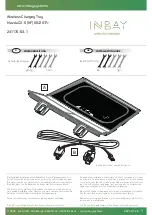
295 . . .
–
–
–
Section
3
If you do decide to pull a trailer,
here are some important points:
• The gross axle weight ratings
and the gross vehicle weight
rating must not be exceeded.
Trailer tongue weight must be
included in the total vehicle
weight.
See "Vehicle Loading" earlier
in this section for more
information.
• The Gross Combination Weight
Rating is the maximum
permissible total loaded weight
of both the vehicle and the
trailer. Remember to include
the weights of the people that
will ride inside the vehicle.
The total of the vehicle weight
and the trailer weight must not
exceed the Gross Combination
Weight Rating.
• Trailering may be limited by
the vehicle's ability to carry
tongue weight.
Tongue weight must not cause
the vehicle to exceed the gross
vehicle weight rating or the
rear gross axle weight ratings.
The effect of additional weight
may reduce your trailering
capacity more than the total of
the additional weight.
• Do not exceed your vehicle's
Cargo Weight Rating. This
figure is the maximum weight
of the load your vehicle can
carry, not including the weight
of passengers.
The only way to be sure you
are not exceeding any weight
ratings is to weigh your vehicle
and trailer.
If you are using a weight-dis-
tributing hitch, weigh the
vehicle without the spring bars
in place.
• Don't tow a trailer at all during
the first 800 km your new vehi-
cle is driven. The engine, axle
or other parts could be dam-
aged.
• During the first 800 km of
trailer towing, don't drive over
80 km/h and don't make
full-throttle starts.
• Be sure your vehicle's tires are
inflated to the proper pressure.
See the tire information label
for your vehicle's tire inflation
specifications.
Also, see "Vehicle Loading"
earlier in this section for more
information.
• If you are using a weight-dis-
tributing hitch, do not go over
the rear axle limit before
applying the weight
distribution spring bars.
• Consider using a sway control.
See "Hitches" later in this
section.
$10araEscalade.fm Page 295 Wednesday, October 14, 2009 9:52 AM
















































